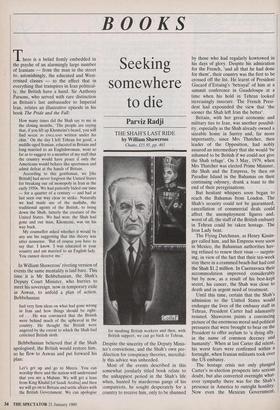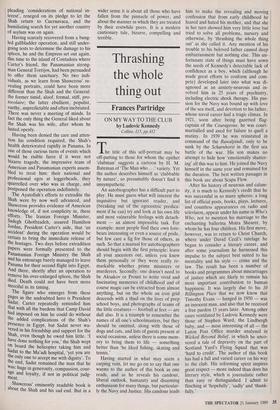BOOKS
Seeking somewhere to die
Parviz Radii
THE SHAH'S LAST RIDE by William Sbawcross
Chatto, £15.95, pp. 463
There is a belief firmly embedded in the psyche of an alarmingly large number of Iranians — from the man in the street to, astonishingly, the educated and West- ernised classes — to the effect that in everything that transpires in Iran political- ly, the British have a hand. Sir Anthony Parsons, who served with rare distinction as Britain's last ambassador to Imperial Iran, relates an illustrative episode in his book The Pride and the Fall: How many times did the Shah say to me in the closing months, 'The people are saying that, if you lift up Khomeini's beard, you will find MADE IN ENGLAND written under his chin.' On the day I left Tehran for good, a middle-aged Iranian, educated in Britain and long married to an Englishwoman, went so far as to suggest to a member of my staff that the country would have peace if only the Americans would behave like sportsmen and admit defeat at the hands of Britain.
According to this gentleman, we [the British] had never forgiven the United States for breaking our oil monopoly in Iran in the early 1950s. We had patiently bided our time — for a quarter of a century — and had at last seen our way clear to strike. Naturally we had made use of the mullahs, the traditional agents of the British, to bring down the Shah, latterly the creature of the United States. We had won: the Shah had gone and our man, Khomeini, was on his way back.
My counsellor asked whether it would be any use his suggesting that this theory was utter nonsense. 'But of course you have to say that. I know. I was educated in your country and am married to an English lady. You cannot deceive me.'
In William Shawcross' riveting version of events the same mentality is laid bare. This time it is Mr Behbehanian, the Shah's Deputy Court Minister, who hurries to meet his sovereign, now in temporary exile in Aswan, to unfold a plan of action. Behbehanian
had very firm ideas on what had gone wrong in Iran and how things should be right- ed . . . He was convinced that the British were behind much of the upheaval in the country. He thought the British were angered by the extent to which the Shah had criticised British sloth.
Behbehanian believed that if the Shah apologised, the British would restore him, so he flew to Aswan and put forward his plan:
Let's get up and go to Mecca. You can worship there and the nation will understand that you are a Mulsim. We will get a loan from King Khalid [of Saudi Arabia] and then we will go on to Britain and settle affairs with the British Government. We can apologise for insulting British workers and then, with British support, we can go back to Tehran.
Despite the sincerity of the Deputy Minis- ter's convictions, and the Shah's own pre- dilection for conspiracy theories, merciful- ly this advice was unheeded.
Most of the events described in this somewhat jocularly titled book relate to the unhappiest period in the Shah's life when, hunted by murderous gangs of his compatriots, he sought desperately for a country to receive him, only to be shunned by those who had regularly kowtowed in his days of glory. Despite his admiration for the French, 'and all that he had done for them', their country was the first to be crossed off the list. He learnt of President Giscard d'Estaing's 'betrayal' of him at a summit conference in Guadeloupe at a time when his hold in Tehran looked increasingly insecure. The French Presi- dent had expounded the view that 'the sooner the Shah left Iran the better'.
Britain, with her great economic and military ties to Iran, was another possibil- ity, especially as the Shah already owned a sizeable home in Surrey and, far more importantly, since Mrs Thatcher, then leader of the Opposition, had nobly assured an intermediary that she would 'be ashamed to be British if we could not give the Shah refuge'. On 3 May, 1979, when Mrs Thatcher was elected Prime Minister, the Shah and the Empress, by then on Paradise Island in the Bahamas on their continuing odyssey, drank a toast to the end of their peregrinations.
But hesitant whispers soon began to reach the Bahamas from London. The Shah's security could not be guaranteed, cancellation of commercial deals could affect the unemployment figures and, worst of all, the staff of the British embassy in Tehran could be taken hostage. The Iron Lady bent.
The Flying Dutchman, as Henry Kissin- ger called him, and his Empress were soon in Mexico, the Bahamian authorities hav- ing refused to renew their visas — surpris- ing, in view of the fact that their ten-week stay there in a crammed beach-hut had cost the Shah $1.2 million. In Cuernavaca their accommodation improved considerably but by now, as a result of his best-kept secret, his cancer, the Shah was close to death and in urgent need of treatment.
Until this time, certain that the Shah's admission to the United States would endanger the lives of the embassy staff in Tehran, President Carter had adamantly resisted. Shawcross paints a convincing picture of the enormous moral and political pressures that were brought to bear on the President to offer asylum to 'a dying ally, in the name of common decency and humanity'. When at last Carter did relent, his worst fears were confirmed within a fortnight, when Iranian militants took over the US embassy. The hostage crisis not only plunged Carter's re-election prospects into serious doubt, but also converted overnight what- ever sympathy there was for the Shah s presence in America to outright hostility. Now even the Mexican Government, pleading 'considerations of national in- terest', reneged on its pledge to let the Shah return to Cuernavaca, and the humiliating search for yet another country of asylum was on again.
Having scarcely recovered from a bung- led gallbladder operation, and still under- going tests to determine the damage to his spleen, he and the Empress set out again, this time to the island of Contadora where Carter's friend, the Panamanian strong- man General Torrijos, had been persuaded to offer them sanctuary. No two indi- viduals, as we learn from Shawcross' re- vealing portraits, could have been more different than the Shah and the General: the former timid, aloof, formal, stiff, pro- tocolaire; the latter ebullient, populist, earthy, unpredictable and often inebriated. There was never a meeting of minds. In fact the only thing the General liked about the Shah was his wife, after whom he lusted openly.
Having been denied the care and atten- tion his condition required, the Shah's health deteriorated rapidly in Panama. In one of those curious turns of events which would be risible farce if it were not bizarre tragedy, the impressive team of American and Panamanian experts assem- bled to treat him: their national and Professional egos at loggerheads, they quarrelled over who was in charge, and Postponed the operation indefinitely.
The Ayatollah's efforts to extradite the Shah were by now well advanced, and Shawcross provides evidence of American knowledge of, if not complicity in, these efforts. The Iranian Foreign Minister, Sadegh Ghotbzadeh, assured Hamilton Jordan, President Carter's aide, that 'an accident' during the operation would be certain to bring the immediate release of the hostages. Two days before extradition Papers were formally presented to the Panamanian Foreign Ministry the Shah and his entourage barely managed to leave Panama for their second flight into Egypt. And there, shortly after an operation to remove his over-enlarged spleen, the Shah died. Death could not have been more merciful in its timing. The figure who emerges from these Pages as the undoubted hero is President Sadat. Carter repeatedly reminded him that with all the burdens that Camp David had imposed on him he could do without the added complications of the Shah's presence in Egypt, but Sadat never wa- vered in his friendship and support for the Shah, even though he owed him little. 'I have done nothing for you,' the Shah wept O n board the helicopter taking him and Sadat to the Ma'adi hospital, 'yet you are the only one to accept me with dignity'. To the end, Sadat remained the man that he was: huge in generosity, compassion, cour- age and loyalty, if not in political judg- ment.
Shawcross' eminently readable book is about the Shah and his sad end. But in a wider sense it is about all those who have fallen from the pinnacle of power, and about the manner in which they are treated by their erstwhile peers. It is a modern cautionary tale, bizarre, compelling and terrible.



























































 Previous page
Previous page